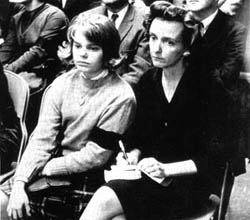The first oral argument was for the Tinkers, given by Dan Johnston. His argument mainly focused on a certain stipulation given in not only the armband policy given by the school board, but also the case of Burnside v. Byars. This stipulation, as stated in Burnside, was that First Amendment rights could only be curtailed when there was the threat of substantial disruption. However, the record showed that there had been no such disruption. On the first day of the incident, Echardt was suspended in the morning and there were no incidents relating to him or his armband. The same day, Mary Beth Tinker wore her armband all morning and even talked to several other students about the armband during her lunch and free periods. Again there was no disruption. The next day, when John Tinker wore his, he likewise went all morning wearing the armband without any incidents.
When the question was raised by Justice White about whether or not they wore their armbands in the classroom and if this caused a disruption in the learning environment, Johnston gave the argument that no one, including teachers and other students, testified that the armbands were in any way disruptive. However, Justice White continued saying that if the armband was doing what it was intended to do, that is conveying a message effectively, then children in the classroom would be shifting their attentions to the message from what they were supposed to be doing. It was then revealed that this policy was applicable to the entire building at all times, including breaks and lunch periods, and Johnston contended that this policy was the result of the school board trying to ensure that political views they did not agree with were not expressed in the school environment.
At this point, the mootness of the case, or whether or not it could still be applied when the decision is issued, was disputed. The justices asked how the case could still be applicable if the students were out of school or if the Vietnam War were ended before the decision was issued by the Court. However, Johnston argued that while the case would appear moot in reference to the Tinkers, they had applied for damages and they had received a punishment of six days suspension. Additionally, this would be an issue that would come up time and time again as students started finding their voices and wanting to express them. If they found themselves severely limited by the schools, then they would continue to bring the issue to the courts.

No comments:
Post a Comment